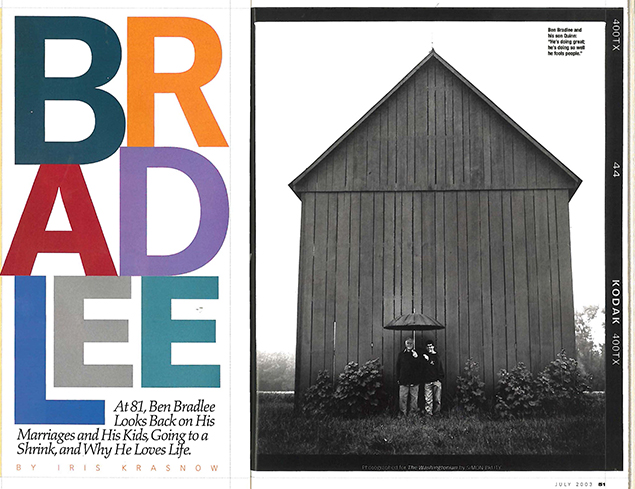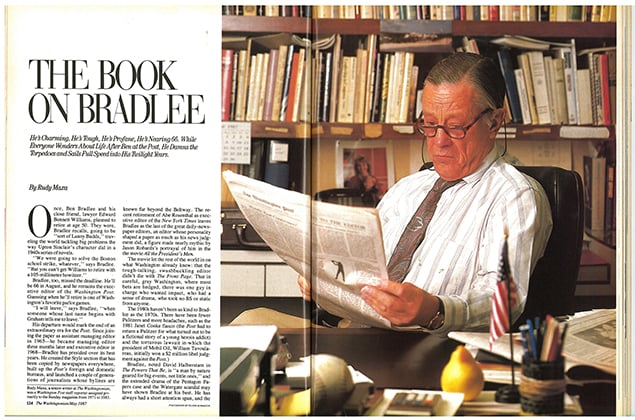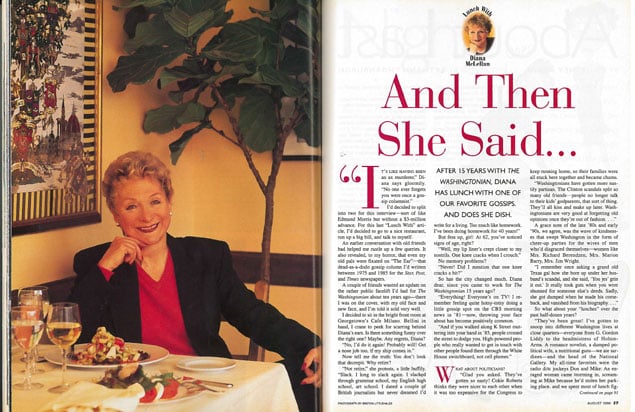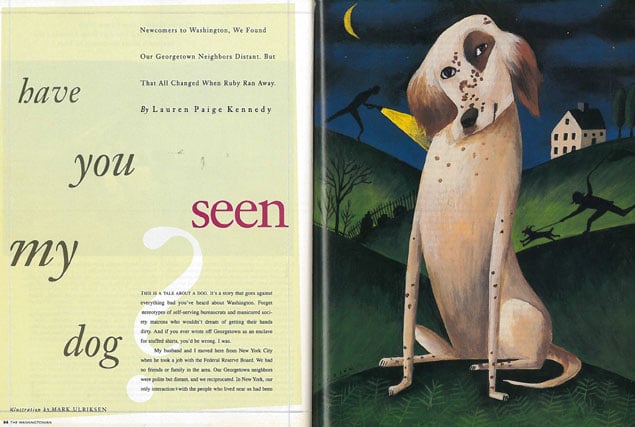Everybody in politics has a most-feared nightmare. For President Reagan, it might be dozing off and finding Ted Kennedy in the White House. For Kennedy, it might be dreaming of Jesse Helms there. Even political writers have one. Our nightmare came to pass just before Christmas, when Ted Kennedy took us by surprise and announced that he won’t be running in 1988.
It wasn’t the decision that was a nightmare for us. We’ve covered enough Kennedy campaigns. It was the timing. One fear grips everyone who has ever written about a candidate for a magazine with a lead time of a month or more. That dread is that the candidate will withdraw after the story is written but before the magazine comes out.
On the day before Kennedy’s late-December announcement, we turned in this month’s column to The Washingtonian on—you guessed it—Ted Kennedy’s preparations to run for President in 1988. We had interviewed a number of old Kennedy supporters who said they thought he was a hell of a guy, a hell of a Democrat, and a hell of a senator, but that they hoped he wouldn’t do it.
The lead of the column that will never see the light of day said: “It used to be taken as gospel that all a Kennedy had to do was announce for the presidency and the stampede would be on: The old soldiers of past political wars would come out of the woodwork in droves to sign up for the next campaign. It used to be, but no more.”
So far, so good. We even wrote that Kennedy was champing at the insinuations that his vote for the Gramm-Rudman-Hollings deficit-reduction straitjacket meant he was trying to shake his liberal image and move to the center. But after going on for another 3,000 words about how Kennedy, after his disastrous 1980 campaign, had put together an impressive machine and raised nearly $7 million, we ended up by saying:
“Kennedy himself is an experienced political battler. He has been hit often and he cuts easily, and he bears a lot of scar tissue. But unlike other Kennedys, he has lost as well as won, and he knows losing isn’t the end of the world. So it’s our guess that when the bell rings, he’ll be there.”
• • •
We should know better by now. Although the cliche is that every politician who ever gets mentioned as a presidential prospect becomes incurably afflicted with White House Fever, the record of reluctant dragons is long. The path of political reporting is strewn with the carcasses of clairvoyants who finger politicians who ”want to be President so much they can taste it”—but in the end don’t run. There are more than a few bones lying along the same path, too, of journalistic crystal-ballers who took it for granted that incumbent Presidents would run for re-election.
Going back to 1952, the public expectation as late as March of that year was that Harry Truman, in his seventh year in the White House but eligible for re-election, would run again. He had confided to intimates that he wanted to retire. But the prospect of Senator Estes Kefauver of Tennessee, who beat him in the New Hampshire primary, being the Democratic nominee forced Truman to reconsider. Finally, he announced in a Jefferson-Jackson Day speech that he wouldn’t run. In the audience were an astonished Adlai Stevenson, who previously had rejected a Truman bid to make the race, and a host of political writers caught with their reportorial pants down.
In 1959, it was Governor Nelson Rockefeller of New York who did a swan dive, and not for the last time. Rockefeller had little use for the Republican front-runner, Vice President Richard Nixon, and for months he had conspicuously been canvass ing his own chances. But the day after Christmas—it’s funny how the holidays affect politicians—he suddenly announced a no-go. It wasn’t that he didn’t have White House Fever. Rather, he read the political handwriting correctly, observing that ”the great majority of those who will control the Republican convention stand opposed to any contest for the nomination.”
New York political reporters, who are so convinced that their city and state remain at the center of the universe that they used to talk of Mayor John Lindsay and even Governor Hugh Carey as presidential timber, took the pipe on that one.
And to make matters worse, after having specified that his decision was ”definite and final,” Rocky about four months later, not able to bear the thought of Tricky Dick in the Oval office, put out the word that he would accept a draft. He proceeded to bad-mouth Nixon publicly, until Nixon flew to New York and negotiated a platform deal at Rockefeller’s apartment known as the “Compact of Fifth A venue”—and dubbed “the Munich of the Republican party” by Barry Goldwater.
In 1964, it was the turn of Attorney General Robert Kennedy. In July, a month before the Democratic convention in Atlantic City, President Lyndon Johnson called Kennedy to the White House and told him he had decided not to ask any member of his Cabinet to be his running mate.
But at the convention, a groundswell built for drafting Kennedy for Vice President. The gambit was tempting for Kennedy. We remember how, in his crowded hotel suite in advance of Johnson’s melodramatic selection of Hubert Humphrey, Kennedy listened to the urgings of assorted mischief-makers and toyed with the idea of going to the floor, a move they assured him would set off a stampede. In the end, Kennedy said no, killing off stories of the draft.
• • •
In late 1967 and early 1968, the professional prognosticators suffered a quadruple whammy. First it was Rockefeller who delivered the treatment to the two of us personally on the deck of the SS Independence during the national governors’ “Ship of Fools” cruise to the Virgin Islands. He told us not only that he wouldn’t run but that “I don’t want to be President. ” We rushed to the ship’s telegraph room to file the story that Rockefeller was definitely out and would support George Romney against Nixon. In a few months’ time, Rockefeller was saying he would accept a draft and he was in the thick of the speculation again.
Next it was Romney’s turn. He had campaigned doggedly through New Hampshire, but the polls were showing him getting clobbered by Nixon there. A week or so before the primary against Nixon, Romney called a news conference and pulled out of the race.
We were traveling with Nixon in New Hampshire that day and remember how his young press aide, now White House communications director Pat Buchanan, herded Nixon into a men’s room, closed the door, and told him the news.
The spotlight now swung back to Rockefeller, who had indicated he was weakening. We all took the bait, and the stories started rolling out of portable typewriters everywhere about how Rocky was expected to throw his hat into the ring. (That’s how the Political Writers’ Union requires us to put it.) Amid great fanfare on March 21, 1968, Rockefeller paraded into the ballroom of the New York Hilton, supporters cheering lustily, and announced he would not run.
The one consolation in this particular snookering was that another politician got the treatment along with the press corps. Governor Spiro T. Agnew of Maryland, then marching under liberal colors, had advertised himself conspicuously as the spearhead of a draft-Rockefeller effort. Anticipating a yes from Rocky, Agnew set up a television set in his office in Annapolis and invited in the press corps so he could crow. Spiro T. was humiliated in view of his ”guests.” In short order, Agnew was aboard the Nixon bandwagon.
The fourth whammy came ten days later, when President ‘Johnson, already the write-in victor in the New Hampshire primary but politically seared by the close race Senator Eugene McCarthy had run against him, jolted the country by announcing he would not seek reelection. We were in Wisconsin at a McCarthy speech when the news came, and once again were as surprised as everybody else. A lot of LBJ prediction stories had to be eaten that night.
In 1968, after the assassination of Robert Kennedy, his brother Ted got his first opportunity to say yes to a presidential bid, and said no. As the national convention in Chicago braced itself for the gloomy prospect of Hubert Humphrey’s candidacy, important Democrats including Mayor Dick Daley of the host city urged Kennedy to permit his name to be placed in nomination. Still grieving the loss of his brother and citing family responsibilities, Kennedy declined. There was little surprise at that Ted Kennedy decision. It was different, however, in succeeding years.
• • •
Although the death at Chappaquiddick occurred in 1969, by 1972 Kennedy was back on the national political scene and the inevitable presidential speculation was being heard. Still, it was not all that surprising when Kennedy announced in 1974 that he would not run in 1976. He said his decision was “final, firm, and unconditional,” but still there were many who declined to take him at his word.
The doubting Thomases were on duty again in 1979, saying Kennedy would never challenge an incumbent President of his own party, when he pulled a reverse surprise by announcing he would take on Jimmy Carter in 1980. Then, in 1983, he was back to acting as if he would run in 1984, and he then pulled the rug out from under all the know-it-alls who said he most certainly would.
By this time we should have gotten the picture. Ted Kennedy was Lucy, the press corps was Charlie Brown, and the presidency was the football. Every four years Lucy Kennedy would put the football down and urge all us Charlie Browns to kick it.
Then, when we came running full-tilt to kick it between the uprights, Lucy would yank it away, leaving us to go sprawling. Six times Kennedy has been the focus of presidential speculation, and each time he has crossed up much of the smart money—five times by saying no and once by saying yes.
So you can see why our nightmare is the candidate who walks and talks like a duck and then turns out to be a turkey, after we’ve proclaimed him a duck. We can only reflect again after this latest Kennedy no-go that we’re lucky it happened before our why-Teddy-is-running column actually made it into this month’s Washingtonian.
The question remains, though: Ted, what about ’92?
This article appears in the February 1986 issue of The Washingtonian.


















